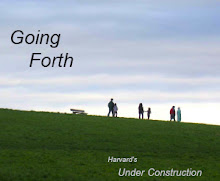EWTN has the full text of Pope Benedict XVI's address this morning to the United Nations General Assembly in New York. Here's an excerpt from roughly the second half of the pope's address. If you're like me, you'll have to read it slowly to grasp all that the pope is getting at -- he is a very dense thinker, in the sense that every sentence and every clause is tightly packed with meaning, and his ideas unfold over the course of paragraphs rather than in catchy slogans or phrases. Here, the pope touches on the basis of human rights, the discernment of good and evil, the role of religion in society, the aim of inter-religious dialogue, and the true meaning of religious liberty:
"Experience shows that legality often prevails over justice when the insistence upon rights makes them appear as the exclusive result of legislative enactments or normative decisions taken by the various agencies of those in power. When presented purely in terms of legality, rights risk becoming weak propositions divorced from the ethical and rational dimension which is their foundation and their goal. The Universal Declaration, rather, has reinforced the conviction that respect for human rights is principally rooted in unchanging justice, on which the binding force of international proclamations is also based. This aspect is often overlooked when the attempt is made to deprive rights of their true function in the name of a narrowly utilitarian perspective. Since rights and the resulting duties follow naturally from human interaction, it is easy to forget that they are the fruit of a commonly held sense of justice built primarily upon solidarity among the members of society, and hence valid at all times and for all peoples. This intuition was expressed as early as the fifth century by Augustine of Hippo, one of the masters of our intellectual heritage. He taught that the saying: Do not do to others what you would not want done to you 'cannot in any way vary according to the different understandings that have arisen in the world' (De Doctrina Christiana, III, 14). Human rights, then, must be respected as an expression of justice, and not merely because they are enforceable through the will of the legislators.
"Ladies and Gentlemen,
"As history proceeds, new situations arise, and the attempt is made to link them to new rights. Discernment, that is, the capacity to distinguish good from evil, becomes even more essential in the context of demands that concern the very lives and conduct of persons, communities and peoples. In tackling the theme of rights, since important situations and profound realities are involved, discernment is both an indispensable and a fruitful virtue.
"Discernment, then, shows that entrusting exclusively to individual States, with their laws and institutions, the final responsibility to meet the aspirations of persons, communities and entire peoples, can sometimes have consequences that exclude the possibility of a social order respectful of the dignity and rights of the person. On the other hand, a vision of life firmly anchored in the religious dimension can help to achieve this, since recognition of the transcendent value of every man and woman favours conversion of heart, which then leads to a commitment to resist violence, terrorism and war, and to promote justice and peace. This also provides the proper context for the inter-religious dialogue that the United Nations is called to support, just as it supports dialogue in other areas of human activity. Dialogue should be recognized as the means by which the various components of society can articulate their point of view and build consensus around the truth concerning particular values or goals. It pertains to the nature of religions, freely practised, that they can autonomously conduct a dialogue of thought and life. If at this level, too, the religious sphere is kept separate from political action, then great benefits ensue for individuals and communities. On the other hand, the United Nations can count on the results of dialogue between religions, and can draw fruit from the willingness of believers to place their experiences at the service of the common good. Their task is to propose a vision of faith not in terms of intolerance, discrimination and conflict, but in terms of complete respect for truth, coexistence, rights, and reconciliation.
"Human rights, of course, must include the right to religious freedom, understood as the expression of a dimension that is at once individual and communitarian - a vision that brings out the unity of the person while clearly distinguishing between the dimension of the citizen and that of the believer. The activity of the United Nations in recent years has ensured that public debate gives space to viewpoints inspired by a religious vision in all its dimensions, including ritual, worship, education, dissemination of information and the freedom to profess and choose religion. It is inconceivable, then, that believers should have to suppress a part of themselves - their faith - in order to be active citizens. It should never be necessary to deny God in order to enjoy one's rights. The rights associated with religion are all the more in need of protection if they are considered to clash with a prevailing secular ideology or with majority religious positions of an exclusive nature. The full guarantee of religious liberty cannot be limited to the free exercise of worship, but has to give due consideration to the public dimension of religion, and hence to the possibility of believers playing their part in building the social order. Indeed, they actually do so, for example through their influential and generous involvement in a vast network of initiatives which extend from Universities, scientific institutions and schools to health care agencies and charitable organizations in the service of the poorest and most marginalized. Refusal to recognize the contribution to society that is rooted in the religious dimension and in the quest for the Absolute - by its nature, expressing communion between persons - would effectively privilege an individualistic approach, and would fragment the unity of the person."
Friday, April 18, 2008
Subscribe to:
Post Comments (Atom)


1 comment:
hi all
http://www.tor.com/community/users/swatabtagmy1985
http://www.tor.com/community/users/liatactpusclin1975
http://www.tor.com/community/users/redciovical1985
http://www.tor.com/community/users/spikuninam1986
http://www.tor.com/community/users/abinorcon1987
Post a Comment